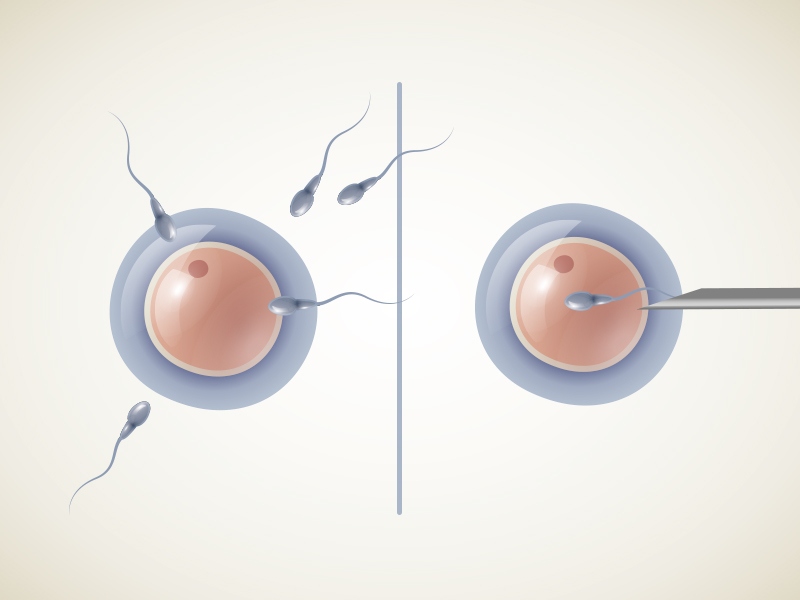IVF+ICSI. Procedure and Treatment

ICSI (Intra Cytoplasmic Sperm Injection) is usually conducted by male infertility caused by the reduction of the fertility ability of sperm cells. This method of infertility treatment promotes penetration of a sperm cell (previously selected on the basis of morphological and other characteristics) into an egg.
Indications for ICSI usage:
- Azoospermia – absence of sperm cells in ejaculate;
- Oligospermia – decrease of sperm cells concentration;
- Astenozoospermia – less than 1 mln of active sperm cells in 1 ml of ejaculate;
- Teratozoospermia – less than 5% of sperm cells of normal structure;
- Combination of sperm pathologies (it might be various combinations like changes in concentration, mobility and structure of sperm cells which significantly decrease fertility abilities of sperm cells)
- Presence of antispermic antibodies in ejaculate which prevents natural fertilization even if sperm cells concentration is normal;
- Absence or unsatisfactory egg fertilization by the first IVF attempt;
- Woman is over 38.
How is ICSI conducted?
ICSI procedure is conducted on the same or next day of the puncture of eggs if fertilization didn’t occur on its own. Before the conducting of ICSI procedure cells of radiate crown which surround an egg are removed. Such micromanipulation is performed only on the mature eggs if first directing body is present. Sperm cells might be taken from ejaculate or using surgical methods. With help of special micro instruments sperm cell of the best quality is selected. It is put into microneedle due to which egg pellucid zone is punctured and, in such a way, sperm cell gets into the ooplasm. In other words, eggs got by puncture are fertilized.
ICSI Successful Rates
Statistic of ICSI successful rates confirms that fertilization occurs in 30-80% of cases. Possibility of the normal development of the embryos is 90-95%. But still there are cases when eggs aren’t fertilized because of possible damage of eggs during ICSI procedure, low quality of gametes (presence of chromosomal anomalies).
Favourable conditions for successful ICSI procedure:
- active sperm cells taken from ejaculate or patient’s testicle;
- eggs of high quality.
At the same time degree of male infertility as a matter of fact doesn’t influence result of ICSI procedure. According to the statistic ICSI procedure isn’t influenced by amount of sperm cells, their morphology and mobility.
Possible genetic risks of ICSI usage
Fertility specialists inform that ICSI is quite a specific kind of male infertility treatment. One of the most serious problems which might be caused is a possible transfer of defective genes to the future child. To avoid such genetic risk preliminary genetic screening which define the presence of anomalies is performed.
ICSI procedure by itself can’t cause genetic failures. But genetic load of intended parents can significantly influence health conditions of their child. In such cases PGD gives an opportunity to check embryos for genetic and chromosomal defects.


